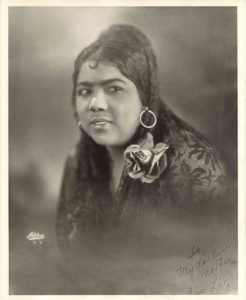Lizzie Miles
Lizzie Miles was a vocalist adept at both blues and jazz stylings whose career spanned most of the modern jazz age.

Courtesy of Louisiana State Museum.
A promotional photograph of jazz and blues vocalist, Lizzie Miles.
Lizzie Miles was the stage name of Elizabeth Mary Landreaux, a blues and jazz vocalist whose career spanned the advent of jazz in New Orleans to its post–World War II revival. Nicknamed the “Creole Songbird,” Miles said of her work, “To me I sing love songs—sad songs—torchy songs better. Guess it’s because I had such a hard, sad life from as far back as I can remember, is why.” Though often classified as a blues singer, Miles preferred to be known as a performer of many musical styles.
Early Success in New Orleans; Migration to Chicago
Lizzie Miles was born to a Creole family on March 31, 1895, and raised in the Faubourg Marigny, a neighborhood bordering the Mississippi immediately downriver from the French Quarter. French was her first language, and throughout her career Miles sang both in her native tongue and in English. Considered “light-skinned” at a time when skin tone dictated a person’s social fluidity, Miles performed with bands and before audiences both predominantly black and predominantly white. Her talent was realized early in her life and brought to maturity by her early teens, when she began singing with some of the city’s top bandleaders, including trombonist Edward “Kid” Ory—also a Creole—and cornetist Joe “King” Oliver, mentor to Louis Armstrong.
The New Orleans cultural atmosphere in which Miles made her debut was rich in working-class venues for performers of blues and early jazz. In America at large, and especially in the South, tent shows, traveling circuses, and touring vaudeville and minstrel acts were popular, and many performers who worked those circuits spent the colder winter months in New Orleans. One of those performers was Gertrude “Ma” Rainey, often called the “Mother of the Blues.” Rainey was a friend of King Oliver and may have influenced a young Lizzie Miles. By her late teens, Miles joined the traveling circuits and established a reputation sufficient to warrant her migrating north to Chicago, Illinois, with dozens of other New Orleans musicians—King Oliver included—in the years immediately following the end of World War I.
A Jazz-Age Career Curtailed and Later Revived
From Chicago, Miles eventually relocated to New York City, where, at the age of twenty-seven, she made her recording debut on the pioneering Okeh Records in 1922. Miles continued making records throughout the 1920s and 1930s—nearly seventy releases in total—for well-known national labels and smaller, independent companies, sometimes under the pseudonyms Mandy Smith or Jane Howard. She was equally popular as a live performer, touring Europe in 1924 and 1925, with an extended stay in Paris, before returning to New York in 1926. Unfortunately, an illness curtailed her career during the early 1930s; she recorded and appeared in live performances intermittently throughout the Great Depression and up to World War II, when she formally retired from music for the remainder of the 1940s.
Launching a second career in 1950 as a traditional jazz-revival vocalist, Miles had acquired a distinctive mannerism: she insisted on performing from either the side or in front of the stage because, she said, she had prayed for healing when she was ill and pledged to never set foot on stage again. She nonetheless acquired a reputation as an important and vibrant musical figure, significant enough for revivalist label Cook Records to record three albums in 1956. She appeared at the Monterey Jazz Festival in 1958 before retiring again. Miles died of a heart attack on March 17, 1963, in New Orleans.
Since being reissued on CD in 2004 by Smithsonian Folkways, the 1956 titles Blues and Moans, Hot Songs My Mother Taught Me and Torchy Lullabies My Mother Sang to Me offer evidence of her unique approach to music. The bulk of her early, more commercially oriented work was also reissued on CD in 1996 by Austrian label Document Records under the title Lizzie Miles, Complete Recorded Works. The soundtrack for the 2013 Oscar-nominated Woody Allen film, Blue Jasmine, featured a version of Miles’s “A Good Man Is Hard to Find.”
